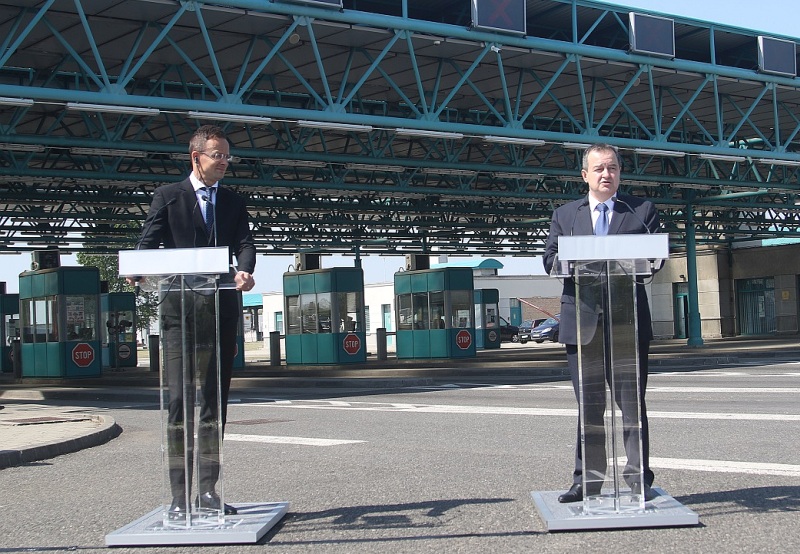First Deputy Prime Minister and Minister of Foreign Affairs Ivica Dacic said that as of today, citizens of Serbia and Hungary who live within 50 kilometres of the border can start crossing again the border between the two countries at three crossings.
- Serbia
Get to know Serbia
- Citizens
Culture and science
Health services
Pension and disability insurance
- Business
Employment
Economy
- Media
- Government
- Contact
Keep in touch
Keepin touch
Whether you have a question, comment, suggestion or any problem in the purview of the government, send us your message and we will try to respond as soon as possible. If your problem is not in our purview, we will forward your message to the relevant institution.
Exceptional cooperation of Serbia, Hungary during pandemic
Dacic, who met with Hungarian Minister of Foreign Affairs and Foreign Trade Peter Szijjarto at the Horgos border crossing, explained that the Serbian government made this decision yesterday and that people who live near the border and work across the border or have their property and relatives there will be allowed to cross it.
The First Deputy Prime Minister underlined that the goal is to enable normal life as much as possible, while at the same time respecting the existing restrictions and all expert advice of epidemiologists.
He stressed that relations between Serbia and Hungary have never been better, noting that this has been especially seen during the coronavirus pandemic, when Hungary has greatly helped our country, especially when it comes to organising the return of Serbian nationals.
Dacic said that both countries are preparing to further strengthen economic and strategic cooperation after the epidemic, expressing satisfaction that last year's foreign trade amounted to more than €1.7 billion.
It is important to say that Hungary has emerged as Serbia’s third economic partner within the EU and its sixth trade partner, which is an improvement in relation to the previous period, the First Deputy Prime Minister underlined.
Szijjarto explained that this measure means that farmers who work their land within the zone of 50 kilometres from the state border can use three open border crossings, Roszke-Horgos, Kelebija and Hercegszanto–Backi Breg.
-
 Belgrade, 25 February 2023
Belgrade, 25 February 2023Four people die as result of coronavirus
-
 Belgrade, 12 November 2022
Belgrade, 12 November 2022Five persons die of coronavirus over past 24 hours
-
 Belgrade, 11 November 2022
Belgrade, 11 November 202260 new cases of coronavirus confirmed
-
 Belgrade, 9 October 2022
Belgrade, 9 October 20221,063 more new cases of coronavirus
-
 Belgrade, 8 October 2022
Belgrade, 8 October 202211 people die as result of coronavirus infection
-
 Belgrade, 9 August 2022
Belgrade, 9 August 2022Number of new cases of coronavirus growing
-
 Belgrade, 8 August 2022
Belgrade, 8 August 20226,498 new cases of coronavirus reported
-
 Belgrade, 7 August 2022
Belgrade, 7 August 2022More than 4,000 new cases of coronavirus in Serbia
-
 Belgrade, 6 August 2022
Belgrade, 6 August 2022Coronavirus claims 13 more lives
-
 Belgrade, 3 August 2022
Belgrade, 3 August 202217 people die as a result of COVID-19

